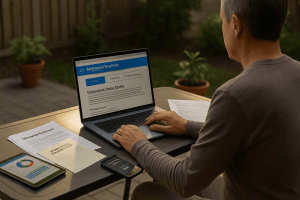
Can I File for Bankruptcy and Keep My House?
Can I File for Bankruptcy and Keep My House If I’m Behind on Payments? Can I file for bankruptcy and
Error: Contact form not found.
Lorem ipsum dolor sit amet, consectetur adipiscing elit. Ut elit tellus, luctus nec ullamcorper mattis, pulvinar dapibus leo.
Can I file for bankruptcy and keep my house? This is one of the most common concerns homeowners face when considering bankruptcy. Fortunately, many people can keep their homes depending on the type of bankruptcy they file and their current financial situation.
If you’re behind on mortgage payments or worried about foreclosure, filing for bankruptcy may offer protection through an automatic stay and specific exemptions. Understanding how this works is key to protecting your home while addressing your debts.
The answer to “Can I file for bankruptcy and keep my house?” often depends on which bankruptcy chapter you choose:
Both options can work, but Chapter 13 offers more protection for those at risk of foreclosure.
Another key factor in whether you can file for bankruptcy and keep your house is how much equity you have and whether it’s covered by your state’s homestead exemption.
A homestead exemption protects a certain amount of your home’s equity from creditors during bankruptcy. If your equity falls under the exemption limit, the trustee cannot force a sale.
It’s essential to calculate your current equity and compare it to your state’s limit before filing.
Filing for bankruptcy and keeping your house also depends on:
Even if you’re facing challenges, you still may qualify to keep your home with the right strategy.
Knowing the answer to “Can I file for bankruptcy and keep my house?” gives you the power to make a smart, informed decision. Bankruptcy doesn’t always mean giving up your home. In fact, many use it as a tool to protect their most important asset.
Wondering can I file for bankruptcy and keep my house based on your unique situation? You don’t have to navigate this alone. A qualified bankruptcy professional can review your mortgage, debt, and income to help you understand what’s possible.
Contact us today to explore your options and get clarity on your rights. Acting now could save your home and give you the financial reset you need.
Yes, Chapter 13 bankruptcy can stop foreclosure and help you repay missed payments over time.
You must still pay your mortgage unless you plan to surrender the house. Bankruptcy may discharge other debts to make your payments more manageable.
This depends on your state’s homestead exemption. Many states protect tens of thousands in home equity, allowing you to keep your house.
Yes, if your equity is fully exempt and you remain current on payments, you can likely keep your home.
Chapter 13 lets you catch up on arrears and avoid foreclosure while keeping your home.
Attorney Advertising. This site is a legal marketing service and does not provide legal advice. Submitting information does not create an attorney-client relationship. Results are not guaranteed.

Can I File for Bankruptcy and Keep My House If I’m Behind on Payments? Can I file for bankruptcy and
| Cookie | Duration | Description |
|---|---|---|
| cookielawinfo-checkbox-analytics | 11 months | This cookie is set by GDPR Cookie Consent plugin. The cookie is used to store the user consent for the cookies in the category "Analytics". |
| cookielawinfo-checkbox-functional | 11 months | The cookie is set by GDPR cookie consent to record the user consent for the cookies in the category "Functional". |
| cookielawinfo-checkbox-necessary | 11 months | This cookie is set by GDPR Cookie Consent plugin. The cookies is used to store the user consent for the cookies in the category "Necessary". |
| cookielawinfo-checkbox-others | 11 months | This cookie is set by GDPR Cookie Consent plugin. The cookie is used to store the user consent for the cookies in the category "Other. |
| cookielawinfo-checkbox-performance | 11 months | This cookie is set by GDPR Cookie Consent plugin. The cookie is used to store the user consent for the cookies in the category "Performance". |
| viewed_cookie_policy | 11 months | The cookie is set by the GDPR Cookie Consent plugin and is used to store whether or not user has consented to the use of cookies. It does not store any personal data. |